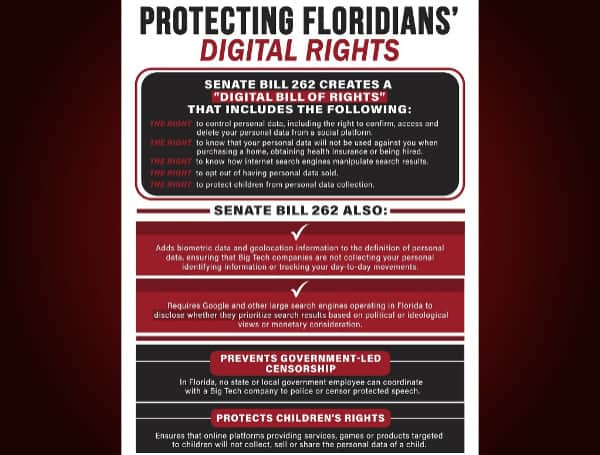Florida Governor Ron DeSantis signed Senate Bill (SB) 262, creating the Digital Bill of Rights. The legislation also requires Google and other large search engines to disclose whether they prioritize search results based on political ideology.
Additionally, SB 262 prevents government-led censorship by prohibiting state or local government employees from colluding with Big Tech companies to censor protected speech.
The newly created Digital Bill of Rights includes:
- The right to control personal data, including the right to confirm, access, and delete your personal data from a social platform;
- The right to know that your personal data will not be used against you when purchasing a home, obtaining health insurance, or being hired;
- The right to know how internet search engines manipulate search results;
- The right to opt out of having personal data sold; and
- The right to protect children from personal data collection.
“Floridians should have the right to control their own personal data,” said Governor Ron DeSantis. “If a multibillion-dollar company is conspiring to take your data and sell it or use it against you, it is your right to be able to protect that data. No longer will the Big Tech oligarchs be able to commandeer your personal information and deprive you of the right to access, confirm, or delete that data as you wish.”
SB 262 gives consumers the right to confirm, access, and delete their personal data from a social media platform and allows users to opt out of the processing of personal data for the purposes of targeted advertising and the sale of personal data.
In the news: In New Ad, Florida Gov. DeSantis Hits Trump For Not Saying “You’re Fired” To Fauci
Additionally, users will be allowed to opt out of the collection of personal data through voice recognition. This bill adds biometric data and geolocation information to the definition of personal information under the Florida Information Protection Act.
This legislation also protects children in online spaces by prohibiting online platforms that provide a service, game, product, or feature to children from processing the personal information of any child or collecting, selling, sharing, or retaining any personal information that is not necessary to provide an online service, product, or feature.
Additionally, this bill will require that an online search engine publishes an up-to-date plain language description of the main parameters that are most significant in determining ranking and the relative importance of those main parameters, including the prioritization or de-prioritization of political partisanship or political ideology in search results.
SB 262 will also prohibit government employees from using their position to communicate with social media platforms to remove content or accounts from the platform. Additionally, a governmental entity may not initiate or maintain any agreements or working relationships with a social media platform for the purpose of content moderation.
In the news: CA Gov. Newsom Calls Florida Gov. DeSantis “Small, Pathetic Man” Amid Migrant Flight Probe
This bill builds on legislation the Governor signed recently, SB 662, to protect the online information of Florida’s students by creating the Student Online Personal Information Protection Act.
That law substantially restricts online operators from collecting, disclosing, or selling student data that is used for school purposes.
Additionally, the legislation prohibits online operators from engaging in targeted advertising practices based on information collected from educational technology and prohibits the online operators from sharing, selling, or renting student data to third parties.
Android Users, Click To Download The Free Press App And Never Miss A Story. Follow Us On Facebook and Twitter. Signup for our free newsletter.
We can’t do this without your help; visit our GiveSendGo page and donate any dollar amount; every penny helps.


